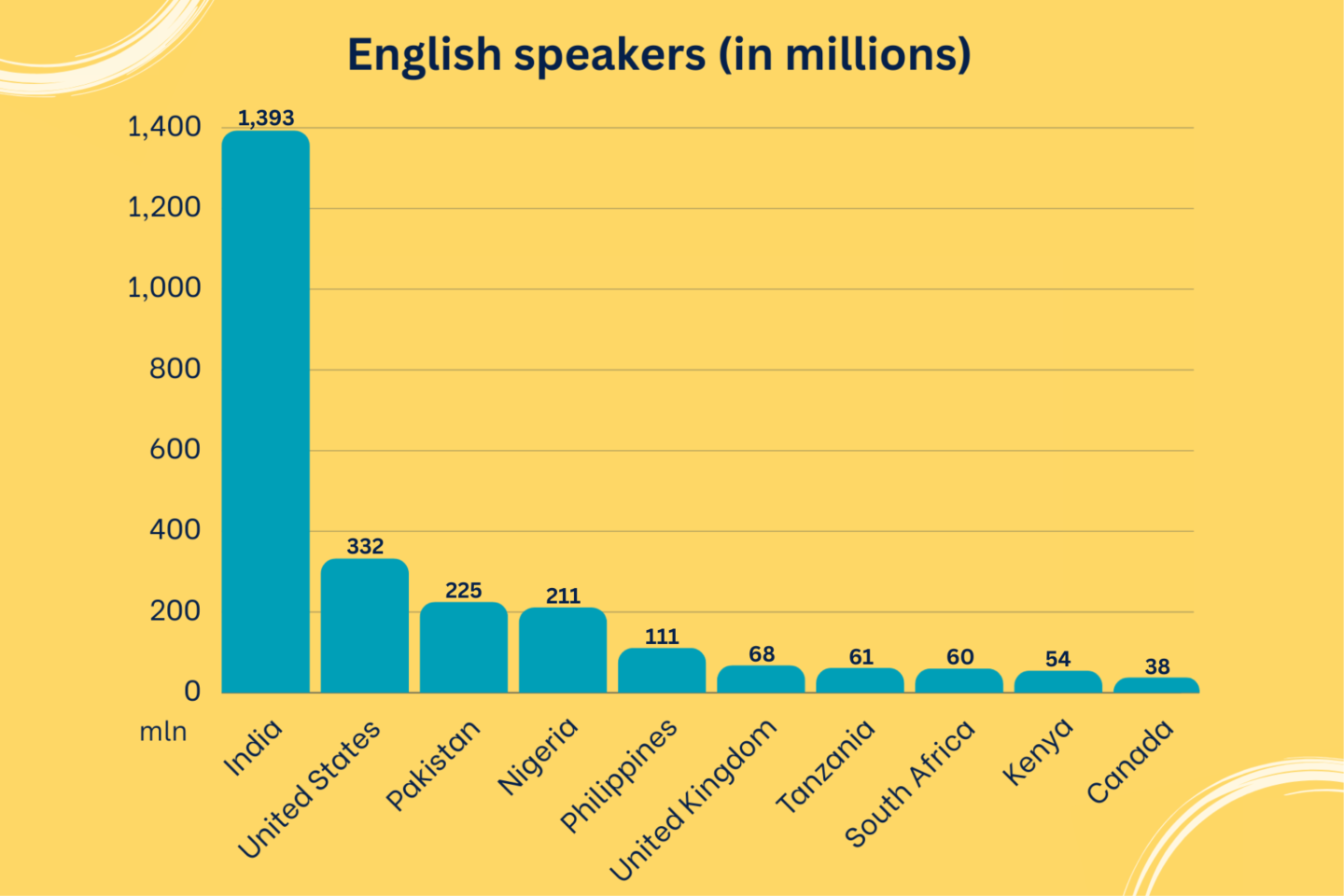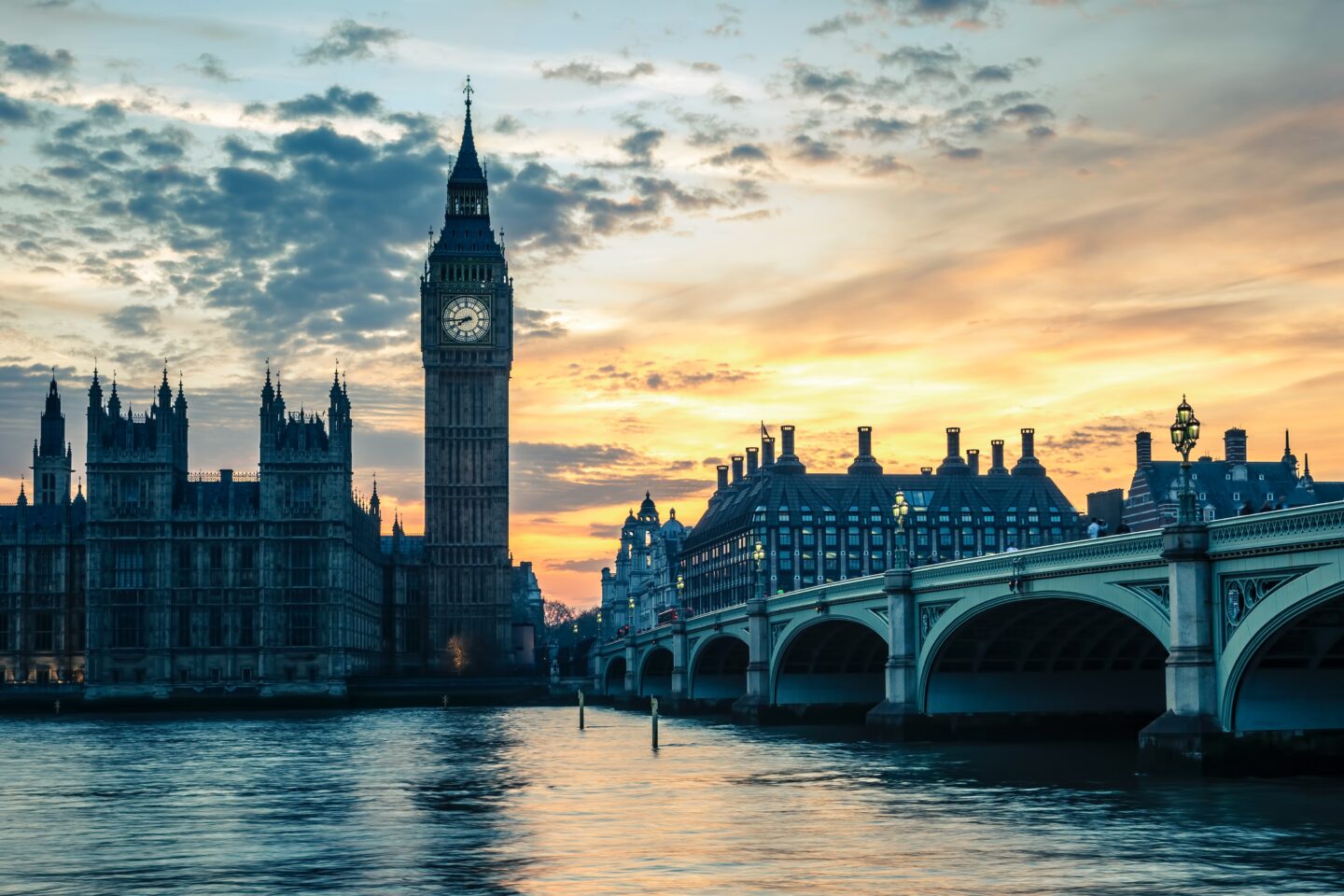10 countries with the most English speakers
In the dynamic landscape of globalised communication, English undoubtably takes centre stage. In this blog post, we delve into the top 10 countries with the most English speakers (as of 2023). From the bustling streets of India to the diverse cultures of Nigeria, let’s embark on a journey to explore the English language’s fascinating presence worldwide.
The English language, often referred to as the global lingua franca, holds a unique position in the modern world. It transcends borders, cultures, and continents, serving as the primary medium for international communication, business, diplomacy, and entertainment. Its widespread adoption as a second language has led to millions of non-native speakers mastering it. So, which countries are among the world’s top English-speaking nations, where English serves as either the primary language or a widely used lingua franca?

India (1,393,409,038 English Speakers)
English holds significant importance in India as it transcends language boundaries. While Hindi dominates as the most widely spoken first language, English is the second-most widely spoken second language. A survey revealed that urban areas and higher socioeconomic groups have more English speakers. Education, religion, caste, and gender all play a role in English proficiency, with younger generations and men more likely to be fluent. Despite perceptions, several northern and northeastern states also have a high proportion of English speakers, suggesting its growing influence and importance.
Did you know? A so-called hybrid language that combines words and phrases from both Hindi and English is called Hinglish.
United States (332,915,073 English Speakers)
American English, also known as United States English or simply U.S. English, encompasses the various dialects native to the United States and has become the dominant language in government, education, and commerce. In recent decades, it has grown to be the most influential form of English worldwide. American English exhibits distinct patterns in pronunciation, vocabulary, and grammar that set it apart from other English dialects. While there is no single mainstream American accent, a continuum known as General American, associated with national media and educated speech, is recognised, and regional accents continue to evolve in the 20th century.
Did you know? American English has various regional accents, with the New York City and Southern accents being the most recognisable ones.
Pakistan (225,199,937 English Speakers)
In Pakistan, English serves as a co-official language alongside Urdu and is spoken by approximately 3 million people from a population of around 133 million. Pakistani English shares many linguistic features with South Asian English and has its distinct characteristics shaped by local languages. It incorporates vocabulary from indigenous languages and features unique word formations that blend elements of English with regional tongues. Additionally, regional accents and subvarieties exist, reflecting historical, cultural, and social factors, while code-switching between English and Urdu is common, often serving various purposes.
Did you know? The word ‘lemon’ is used for both lime and lemon in Pakistani English.
Nigeria (211,400,708 English Speakers)
Emerging from British colonial rule in 1960, Nigeria is part of English-speaking West Africa, along with Ghana, The Gambia, Liberia, Sierra Leone, and a section of Cameroon. Approximately 53% of Nigerians communicate in various forms of English, thus establishing Nigeria as one of the world’s largest English-speaking nations. While English shares co-official status with three indigenous languages—Hausa, Igbo, and Yoruba—English dominates practical use in almost all official contexts, from governance and education to mass media and legal proceedings. Notably, a growing number of young Nigerians now consider Nigerian English as their first language, reflecting the evolving linguistic landscape of the country.
Did you know? Several Nigerian English words and phrases are recognised by the Oxford English Dictionary, e.g., the next tomorrow ‘the day after tomorrow’, org ist ‘gossip’.
Philippines (111,046,913 English Speakers)
Unlike many postcolonial countries, the Philippines didn’t inherit English from British colonialism but rather from American influence. Following the Philippine-American War’s conclusion in 1902, English was swiftly introduced as the principal language for government, business, and education, aided by American teachers known as Thomasites. Despite gaining independence from the United States in 1946, the Philippines retained English as one of its official languages, deeply integrating it into daily life, including business, education, media, and culture, while developing its unique Filipino English variety.
Did you know? Philippine English speakers sometimes use the plural verb form with a singular subject.
United Kingdom (68,207,116 English Speakers)
British English, also known as UK English, encompasses the English language used in Great Britain, including the distinctive dialects within the British Isles such as Scottish English, Welsh English, and Northern Irish English. It can be viewed broadly to encompass this entire range or narrowly to focus solely on the use of English in England. While there are variations in formal written and spoken English within the United Kingdom, there is a degree of uniformity in written English, although spoken forms vary significantly. British English serves as a foundational reference for many former British colonies, Commonwealth nations, and even within the European Union, alongside American English.
Did you know? In British English, the word braces means the same as suspenders in American English.

Tanzania (61,498,437 English Speakers)
English holds a unique position in the United Republic of Tanzania, serving as both an official and educational language alongside Kiswahili, the national language. While Kiswahili is widely spoken in coastal areas and on Zanzibar, English is primarily acquired in formal educational settings, making it a minority language. Estimates suggest that several million Tanzanians have some proficiency in English, though full fluency is limited to a small proportion of the population. Unlike some post-colonial Anglophone nations, there are no native speakers of Tanzanian English, as the majority of Tanzanians first learn an African mother tongue, including Kiswahili, before acquiring English.
Did you know? In Tanzanian English, me is used instead of I in coordinate subjects.
South Africa (60,041,994 English Speakers)
English ranks as the fourth most widely spoken language in South Africa, with less than 10% of the population actively using it. Nevertheless, English enjoys widespread understanding, particularly in urban areas, and features prominently in South African media and official announcements. The historical backdrop of Germanic languages like English and Afrikaans in South Africa is linked to Dutch and British colonisation during the 17th and 18th centuries. Presently, English’s prominence in South African media and governance, despite not being the primary language for most citizens, reflects the enduring influence of colonial languages and power dynamics.
Did you know? In South African English, the slang term robot is used for ‘traffic lights’.
Kenya (54,985,698 English Speakers)
Kenyan English is a unique dialect with variations from Standard American and British English. Its roots trace back to colonial history, with education influenced by British colonisation. Although English is an official language today, the quality of English education varies, leading to some students lacking the desired language skills. Kenya boasts linguistic diversity with numerous native languages. Challenges in standardising Kenyan English persist, impacting social and economic stratification.
Did you know? Kenyan English makes use of only 5 vowel sounds.
Canada (38,067,903 English Speakers)
While Canadian English shares phonological similarities with American English, it also draws influences from British English and exhibits uniquely Canadian features. Approximately 58.1% of Canadians speak English as their first language, while French is the primary language for only 20.8% of the population. Canadian English displays regional variations, with distinctive accents in places like Newfoundland, and differences can be noted between urban and rural areas. Over time, the linguistic landscape of Western Canada evolved due to European immigration and increased exposure to Canadian and American media.
Did you know? There are several words in Canadian English that reference things not found in other English-speaking countries; one such word is poutine, a Canadian dish.
Read more

Native vs. Non-Native Translators: Pros & Cons

A Beginner’s Guide to International English

